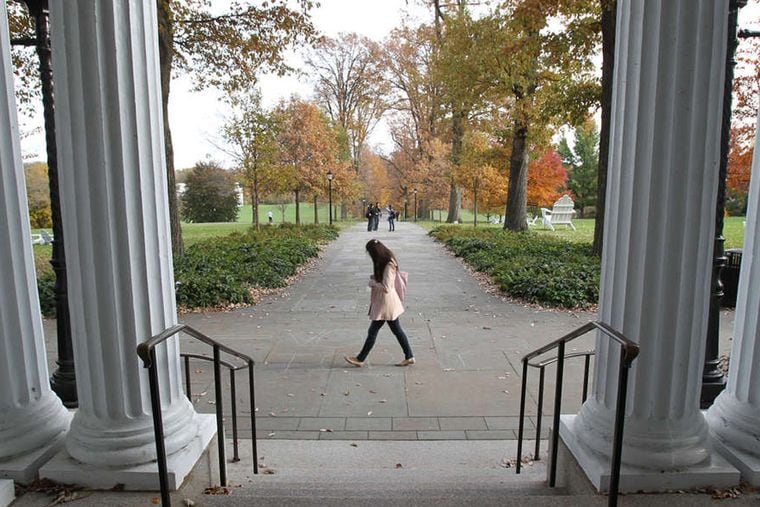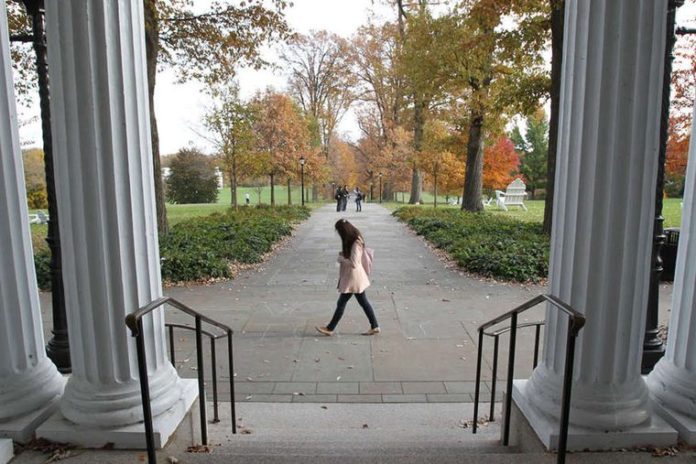
Battle lines have been drawn at Swarthmore College over a decision to partner with an organization that brings in retired military personnel as visiting faculty members.
As a school founded by Quakers, “we have been committed to peace,” said Donna Jo Napoli, a professor of linguistics and social justice. “Our identity, I believe, is in jeopardy in association with this organization. That the professors that would be involved have to have a standing in the military is at least highly suggestive of their believing that war is a possible answer to conflict, and I do not agree with that.”
Napoli was among faculty members who voted earlier this month to ask Swarthmore president Valerie Smith to withdraw the school’s participation in a partnership with the Chamberlain Project, which is funded by the Jennifer and Jonathan Allan Soros Foundation. Jonathan Soros is the son of progressive billionaire George Soros. Others who opposed the move, including some student groups, also called it unfair to create a special path for military officers to become faculty, and cited undue influence on the curriculum by an outside organization and the military’s historically hostile treatment of LGBTQ people.
About 150 of the school’s 251 faculty attended the meeting, with 83 voting to ask the college to terminate the partnership. Others felt it should be kept in place.
“Yes, the U.S. military is a problematic institution, but I think Swarthmore has a tradition of engaging with problematic institutions,” said Dominic Tierney, a political science professor who has written about problems in the U.S. military. “If we want our students to understand the major issues, understand the impacts of the American military on American society and world affairs, then we need students to hear from officers who have firsthand experience on how the military operates and that would be a valuable educational opportunity.”
He said critics should avoid simplistic views of the military and remember it’s a multifaceted and huge institution and that it was elected officials who chose to invade Iraq, with the military acting on those orders.
Started in 2016, the project is named after Joshua Lawrence Chamberlain, a professor at Bowdoin College who also was a Union officer in the Civil War. The organization aims to bridge the “civil‐military divide” and educate future civic, cultural, and business leaders about the armed services. Fellows are expected to teach two classes, mentor students, and participate in school activities. Chamberlain said it could not provide a list of specific courses its fellows have taught. According to bios on its website, they have written on or taught topics including military history and American history.
A college can accept or reject fellows recommended by Chamberlain. If accepted, the program pays 50% of costs, while the college covers the rest.
Other colleges that participate include Amherst, Barnard, Bowdoin, Hamilton, Oberlin, Vassar, and Wellesley, as well as Lehigh University in Bethlehem. The current Chamberlain fellow at Hamilton, Ty Seidule, a retired Army brigadier general and author, served as commencement speaker last weekend.
“He’s been a fabulous addition to our campus community — a terrific teacher and a great colleague,” said David Wippman, Hamilton’s president.
Swarthmore spokesperson Alisa Giardinelli said Smith is considering all the views expressed as she decides whether to continue the partnership.
The president, Giardinelli said, saw it “as a way to bring to campus an underrepresented perspective and provide an opportunity for students, faculty, and staff members to engage with individuals whose experiences are dissimilar from those of the majority of the members of our community, and American society.”
She also noted that Swarthmore hosted military officer and cadet training on campus during World War I and World War II, and that the college recruits veterans to the student body. The college does not have an active ROTC on campus, but allows students to complete programs at other schools.
The debate at Swarthmore has been going on for several months, with multiple faculty meetings. Several student groups, including the Student Government Association and a collective of students from the Middle East and North Africa, as well as some alumni, wrote letters in opposition.
“We see no benefit in ‘building relationships and understanding’ with an organization that has committed a host of war crimes, perpetuates decades-long offensive and money-driven onslaughts in many of our homelands, all the while deploying enlistment practices that prey upon lower-income Black and brown people domestically,” wrote the Middle East and North Africa group.
Several students spoke in favor of the proposal to the student newspaper, the Phoenix, one in an opinion piece and the others, including a student who is also a military veteran, in an interview.
For some others in the Swarthmore community, it’s personal.
“Speaking as a gay man, no single institution in American society has been as relentless in persecuting gay people as the military,” K. David Harrison, a professor of linguistics and cognitive science, said during a faculty meeting. “My friend was dishonorably discharged by the Marine Corps in 2001 for being gay, and it nearly destroyed him. Any former military officer alive today enforced this horrible policy. … Please ask yourself, what other trans people banning organization would we let Swarthmore get into bed with?”
Krista Thomason, an associate professor of philosophy, said she didn’t see bringing in a military member as visiting faculty as tantamount to supporting the military and condoning all it does.
The topic of military ethics comes up in the field of philosophy, and she talks with those involved in the military as part of her scholarly work, she said.
“I don’t think my intellectual exchanges with members of the military count as supporting militarism,” she said.
For Lee Smithey, a professor of peace and conflict studies and sociology, the problem with the Chamberlain partnership is the special path it creates for retired military personnel.
“No one is saying that people with military experience should be barred from applying for faculty positions at the college,” he said. “We just don’t think that military training should be a special criteria for access to faculty positions at the college.”








